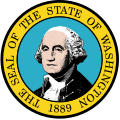The following outline is provided as an overview of and topical guide to the U.S. state of Washington:

Washington is a state in the Pacific Northwest region of the United States, and is named after George Washington, the first President of the United States (it is the only U.S. state named after a president). Washington was carved out of the western part of Washington Territory which had been ceded by Britain in 1846 by the Oregon Treaty as settlement of the Oregon Boundary Dispute. It was admitted to the Union as the 42nd state in 1889. The state's population at the 2010 United States Census was 6,724,540. Washington is often called Washington State or the state of Washington to distinguish it from Washington, D.C.
General reference
edit- Names
- Common name: Washington
- Pronunciation: /ˈwɒʃɪŋtən/
- Official name: State of Washington
- Abbreviations and name codes
- Postal symbol: WA
- ISO 3166-2 code: US-WA
- Internet second-level domain: .wa.us
- Nicknames
- The Evergreen State[1] (currently used on license plates without "the")
- Apple State
- Chinook State[2]
- Common name: Washington
- Adjectival: Washington
- Demonym: Washingtonian
Geography of Washington
edit- Washington is: a U.S. state, a federal state of the United States of America
- Location
- Population of Washington: 6,724,540 (2010 U.S. Census[3])
- Area of Washington:
- Atlas of Washington
Places in Washington
edit- Historic places in Washington
- National Natural Landmarks in Washington
- National parks in Washington
- State parks in Washington
Environment of Washington
edit- Climate of Washington
- Geology of Washington
- Protected areas in Washington
- Superfund sites in Washington
- Wildlife of Washington
- Fauna of Washington
Natural geographic features of Washington
edit- Lakes of Washington
- Mountains of Washington
- Rivers of Washington
Regions of Washington
edit- Cascade Range
- Central Washington
- Columbia Gorge
- Columbia Plateau
- Columbia River
- Eastern Washington
- Inland Empire
- Kitsap Peninsula
- Long Beach Peninsula
- Okanogan Country
- Olympic Peninsula
- Palouse
- Puget Sound
- San Juan Islands
- Skagit Valley
- Western Washington
- Yakima Valley
Administrative divisions of Washington
edit- The 39 Counties of the State of Washington
- Municipalities in Washington
- Cities in Washington
- State capital of Washington: Olympia
- Largest city in Washington: Seattle
- City nicknames in Washington
- Towns in Washington
- Unincorporated communities in Washington
- Cities in Washington
- Census-designated places in Washington
- Municipalities in Washington
Demography of Washington
editGovernment and politics of Washington
edit- Elections in Washington (state)
- Political party strength in Washington
- Washington initiatives to the legislature
- Washington's Lottery
Federal representation
editState government of Washington
editExecutive branch of the government of Washington
edit- Governor of Washington
- State departments
Legislative branch of the government of Washington
editJudicial branch of the government of Washington
editLaw and order in Washington
edit- Cannabis in Washington (state)
- Capital punishment in Washington (state)
- Washington State Constitution
- Gun laws in Washington
- Law enforcement in Washington
- Same-sex marriage in Washington
Military in Washington
editLocal government in Washington
editHistory of Washington
editHistory of Washington, by period
edit- Prehistory of Washington
- Modern exploration of Washington, 1592–1818
- Ioánnis Fokás may have explored the Strait of Juan de Fuca, 1592
- Juan José Pérez Hernández's northern voyage, 1774
- Bruno de Heceta sights the mouth of the Columbia River, 1775
- Charles William Barkley, captain of the Imperial Eagle, explores and names the Strait of Juan de Fuca, 1787
- Robert Gray explores and names the Columbia River, 1792
- William Robert Broughton's voyage to the Columbia River Gorge, 1792
- Lewis and Clark Expedition, 1804–1806
- David Thompson's voyage on the Columbia River, 1811–1812
- Oregon Country, 1818–1846
- Anglo-American Convention of 1818
- Fort Vancouver, 1824–1866
- Provisional Government of Oregon, 1843–1848
- Oregon Treaty of 1846
- Unorganized territory of the United States, 1846–1848
- Oregon Territory, (1848–1853)-1859
- Washington Territory, 1853–1889
- Puget Sound War, 1855–1856
- Yakima War, 1855–1858
- Okanagan Trail, 1858–1859
- Pig War, 1859
- State of Washington since November 11, 1889
- Great Depression, 1929-1939
- 1933 Yakima Valley Strike
- Grand Coulee Dam, 1933-1942
- World War II, 1939–1945
- Japanese American internment, 1942–1945
- Hanford Site, 1943
- Mount Saint Helens eruption of 1980
- Great Depression, 1929-1939
Culture of Washington
editThe Arts in Washington
editSports in Washington
editEconomy and infrastructure of Washington
edit- Agriculture in Washington
- Communications in Washington
- Energy in Washington
- Health care in Washington
- Transportation in Washington
- Airports in Washington
- Ferries in Washington
- Rail transport in Washington
- Roads in Washington
Education in Washington
editEducation in Washington (state)
- K-12 schools in Washington
- Washington Assessment of Student Learning
- Administration of K-12 schools in Washington
- Other related to K-12 education in Washington
- Higher education in Washington
- Colleges and universities in Washington
- Administration of higher education in Washington
See also
editReferences
edit- ^ "Symbols of Washington State". Washington State Legislature. Archived from the original on 2007-03-05. Retrieved 2007-03-11.
- ^ Golenpaul, Dan; Kieran, John, eds. (1995). Information Please Alamanac. Dan Golenpaul Associates. p. 780.
- ^ "U.S. Census Bureau State & County QuickFacts Washington". Archived from the original on 2016-02-17. Retrieved 2011-11-18.

